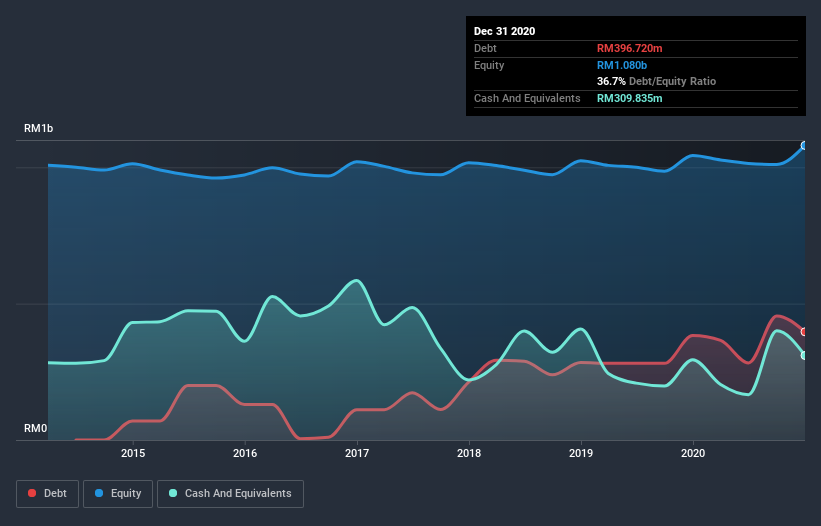- Malaysia
- /
- Gas Utilities
- /
- KLSE:GASMSIA
Gas Malaysia Berhad (KLSE:GASMSIA) Seems To Use Debt Rather Sparingly

Legendary fund manager Li Lu (who Charlie Munger backed) once said, 'The biggest investment risk is not the volatility of prices, but whether you will suffer a permanent loss of capital.' When we think about how risky a company is, we always like to look at its use of debt, since debt overload can lead to ruin. We can see that Gas Malaysia Berhad (KLSE:GASMSIA) does use debt in its business. But the real question is whether this debt is making the company risky.
What Risk Does Debt Bring?
Generally speaking, debt only becomes a real problem when a company can't easily pay it off, either by raising capital or with its own cash flow. If things get really bad, the lenders can take control of the business. While that is not too common, we often do see indebted companies permanently diluting shareholders because lenders force them to raise capital at a distressed price. Having said that, the most common situation is where a company manages its debt reasonably well - and to its own advantage. When we think about a company's use of debt, we first look at cash and debt together.
Check out our latest analysis for Gas Malaysia Berhad
What Is Gas Malaysia Berhad's Net Debt?
The chart below, which you can click on for greater detail, shows that Gas Malaysia Berhad had RM396.7m in debt in December 2020; about the same as the year before. However, because it has a cash reserve of RM309.8m, its net debt is less, at about RM86.9m.

How Healthy Is Gas Malaysia Berhad's Balance Sheet?
The latest balance sheet data shows that Gas Malaysia Berhad had liabilities of RM1.26b due within a year, and liabilities of RM298.2m falling due after that. Offsetting these obligations, it had cash of RM309.8m as well as receivables valued at RM792.3m due within 12 months. So its liabilities outweigh the sum of its cash and (near-term) receivables by RM456.5m.
Of course, Gas Malaysia Berhad has a market capitalization of RM3.48b, so these liabilities are probably manageable. However, we do think it is worth keeping an eye on its balance sheet strength, as it may change over time.
We measure a company's debt load relative to its earnings power by looking at its net debt divided by its earnings before interest, tax, depreciation, and amortization (EBITDA) and by calculating how easily its earnings before interest and tax (EBIT) cover its interest expense (interest cover). This way, we consider both the absolute quantum of the debt, as well as the interest rates paid on it.
Gas Malaysia Berhad has a low net debt to EBITDA ratio of only 0.23. And its EBIT easily covers its interest expense, being 61.9 times the size. So you could argue it is no more threatened by its debt than an elephant is by a mouse. Also positive, Gas Malaysia Berhad grew its EBIT by 27% in the last year, and that should make it easier to pay down debt, going forward. When analysing debt levels, the balance sheet is the obvious place to start. But ultimately the future profitability of the business will decide if Gas Malaysia Berhad can strengthen its balance sheet over time. So if you're focused on the future you can check out this free report showing analyst profit forecasts.
Finally, a company can only pay off debt with cold hard cash, not accounting profits. So we always check how much of that EBIT is translated into free cash flow. During the last three years, Gas Malaysia Berhad produced sturdy free cash flow equating to 54% of its EBIT, about what we'd expect. This free cash flow puts the company in a good position to pay down debt, when appropriate.
Our View
Happily, Gas Malaysia Berhad's impressive interest cover implies it has the upper hand on its debt. And that's just the beginning of the good news since its EBIT growth rate is also very heartening. We would also note that Gas Utilities industry companies like Gas Malaysia Berhad commonly do use debt without problems. Zooming out, Gas Malaysia Berhad seems to use debt quite reasonably; and that gets the nod from us. While debt does bring risk, when used wisely it can also bring a higher return on equity. There's no doubt that we learn most about debt from the balance sheet. However, not all investment risk resides within the balance sheet - far from it. These risks can be hard to spot. Every company has them, and we've spotted 1 warning sign for Gas Malaysia Berhad you should know about.
At the end of the day, it's often better to focus on companies that are free from net debt. You can access our special list of such companies (all with a track record of profit growth). It's free.
When trading Gas Malaysia Berhad or any other investment, use the platform considered by many to be the Professional's Gateway to the Worlds Market, Interactive Brokers. You get the lowest-cost* trading on stocks, options, futures, forex, bonds and funds worldwide from a single integrated account. Promoted
New: Manage All Your Stock Portfolios in One Place
We've created the ultimate portfolio companion for stock investors, and it's free.
• Connect an unlimited number of Portfolios and see your total in one currency
• Be alerted to new Warning Signs or Risks via email or mobile
• Track the Fair Value of your stocks
This article by Simply Wall St is general in nature. It does not constitute a recommendation to buy or sell any stock, and does not take account of your objectives, or your financial situation. We aim to bring you long-term focused analysis driven by fundamental data. Note that our analysis may not factor in the latest price-sensitive company announcements or qualitative material. Simply Wall St has no position in any stocks mentioned.
*Interactive Brokers Rated Lowest Cost Broker by StockBrokers.com Annual Online Review 2020
Have feedback on this article? Concerned about the content? Get in touch with us directly. Alternatively, email editorial-team (at) simplywallst.com.
About KLSE:GASMSIA
Gas Malaysia Berhad
Sells, markets, and distributes natural gas to the industrial, commercial, and residential sectors in Malaysia.
Solid track record with excellent balance sheet and pays a dividend.


